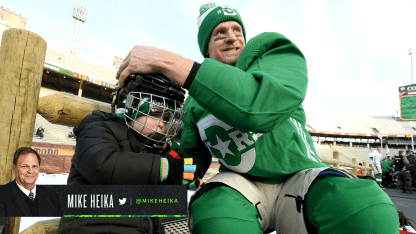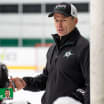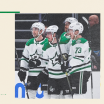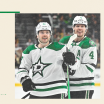I'm a big fan of movies, so this is a good time for me.
With the opportunity -- nay, the responsibility-- to confine myself to the homestead, film study just seems like a great option. For various reasons over the past few days, I have watched "The Natural," "A League of Their Own" and the Carroll Shelby documentary, "Shelby American." Each offering has a different slant. Each has some classic lines. Each has a message that sports is a worthwhile investment of your time.
Heck, for some, it's a pursuit that can define your life.
Heika: In life, some things are much bigger than sports
Hockey and our normal way of life will soon resume, but now is a great time to plant the seeds of future patience and kindness

By
Mike Heika
Senior Staff Writer
The beauty of both "The Natural" and "A League of Their Own" is that baseball impacts the main character for only a short time. Roy Hobbs loves the game, has to leave it for 16 years, and then gets to enjoy one miraculous season. Dottie Hinson grows up in Oregon on a dairy farm and goes back there when her husband, Bob, returns from World War II to raise her family. So, really, she gets just a few months to experience her dream.
Yet, both look at their limited time with the sport as almost life-defining. Why? Because it shows them what their potential is, what they can accomplish when they push themselves to the limit against the best competitors they can find.
When asked why he's unhappy with how his life has turned out, Hobbs says: "I coulda' been better. I coulda' broke every record in the book."
"And then?" Iris Gaines asks.
READ MORE: [Coronavirus pandemic puts Stars' season, rest of league on pause]
"And then?" Hobbs said incredulously. "And then when I walked down the street, people would've looked and they would've said: 'There goes Roy Hobbs: the best there ever was in this game.' "
Dottie Hinson is told countless times that she's the best player in the league, and she often demurs at compliments and feels embarrassed. But you can tell that she knows inside that she's different. When the league needs a boost, she plays to the cameras with a fantastic catch while doing the splits. When the team needs a manager because Jimmy Duggan is too drunk and doesn't care, Dottie steps in.
She's a great example of the old saying:"With great power comes great responsibility."
It's a feeling that many of us can embrace these days. We all have the ability to help do our part to get this virus under control and get our world back where we would like it to be. There will be plenty of opportunities to do even more, and now is a great time to plant the seeds of future patience and kindness.
The story of Carroll Shelby, meanwhile, is one of incredible persistence and redemption. A jack-of-all-trades from East Texas, Shelby had to find a way to recover when his poultry farm went bankrupt. He always liked racing his cars, so he decided to see if he could make a profession of it.
He was spectacular. In less than five years, he became one of the best drivers in the world, winning Sports Illustrated's driver of the year in 1956 and 1957. He continues to win races and gain sponsorship and in 1959, he and Ray Salvadori combine to win the 24 Hours of Le Mans.
Along the way, Shelby deals with crashes and a broken arm, and continues to race. And during the grueling pressure of Le Mans, his heart problems start to get really bad. Shelby has had issues since he was young, but he has always pushed through them. But after that experience and with the advice of doctors. Shelby retires from racing at age 36.
2019-20 NHL season paused
Forced to earn an income, he becomes the ultimate salesman. He starts a driving school in California and noodles around with some ideas about making his own car. He takes an English sportscar and puts a Ford engine in it. The AC Cobra is now one of the most iconic cars of all time.
Shelby goes through highs and lows and becomes an automotive influencer at both Ford and Dodge because of his relationship with Lee Iacocca. Because that industry is so volatile, he is both incredibly successful and near bankruptcy on many occasions. But so many of the interviews during the documentary talk about how he was calm and smart and human, how people loved to work with him and for him.
He certainly had his flaws, and those were also pointed out, but he was remembered by most as just a good dude who loved cars. That's another great lesson to be learned as we all deal with the different pressures presented by social distancing.
Shelby felt he was nearing death in 1990, but got a heart transplant from a young man who had died in his 30s. He ended up living until 2012 and brought more joy to the world through his cars. It was a great bit of fortune for him, but also just kind of how Shelby lived, his friends said. No challenge was too big, no trauma too intense. He was both blessed and beneficent, both shrewd and surrounded by serendipity. The harder he worked, it seemed, the luckier he got.
It's a philosophy worth following.
The guys I hang out with repeat movie scenes all day long. "The Other Guys." "Step Brothers." "She's Out of My League." "Old School." "Dumb and Dumber." We relate through shared experiences. We make each other laugh with just one line from a familiar film.
We also learn from the movies and repeat those lessons. I send my daughter a clip from "A League of Their Own" a couple of times a year when she's feeling down or that maybe her challenges are too difficult. When Dottie Hinson is going back to Oregon and she tells Jimmy Duggan that the whole baseball experience just became "too hard," he shoots back with one of the great lines in the history of sports movies.
FREQUENTLY ASKED QUESTIONS: [How the NHL's pause for coronavirus affects Stars, fans]
"It's supposed to be hard," Duggan says. "If it wasn't hard, everyone would do it. The hard ... is what makes it great."
I have had the privilege of covering some great stories in sports, and I'm always impressed with the battle to become a pro. Yes, certain humans are blessed with certain talents, but you don't get to the highest level unless you know how to work, unless you know how to overcome challenges.
One of the reasons I think we love sports so much is because these incredible people can do things that we can't. It's why we all can't wait for them to get started again. But while we wait, we can learn from movies and try to use that knowledge going forward.
What else are we going to do … cry?
You know what Jimmy Duggan would say about that.
This story was not subject to the approval of the National Hockey League or Dallas Stars Hockey Club.
Mike Heikais a Senior Staff Writer for DallasStars.com and has covered the Stars since 1994. Follow him on Twitter @MikeHeika, and listen to his podcast.


















